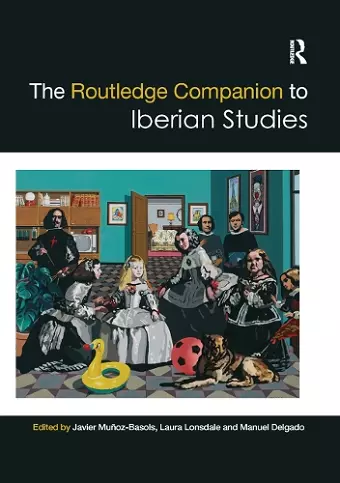The Routledge Companion to Iberian Studies
Laura Lonsdale editor Manuel Delgado editor Javier Muñoz-Basols editor
Format:Paperback
Publisher:Taylor & Francis Ltd
Published:12th Dec '19
Currently unavailable, and unfortunately no date known when it will be back
This paperback is available in another edition too:
- Hardback£250.00(9780415722834)

The Routledge Companion to Iberian Studies takes an important place in the scholarly landscape by bringing together a compelling collection of essays that reflect the evolving ways in which researchers think and write about the Iberian Peninsula.
Features include:
- A comprehensive approach to the different languages and cultural traditions of the Iberian Peninsula;
- Five chronological sections spanning the period from the Middle Ages to the 21st century;
- A state-of-the-art account of the field, reaffirming Iberian Studies as a dynamic and evolving discipline with promising areas for future research;
- An array of topics of an interdisciplinary nature (history and politics, language and literature, cultural studies and visual arts), focusing on the cultural distinctiveness of Iberian traditions;
- New perspectives and avenues of inquiry that aim to promote a comparative mode within Iberian Studies and Hispanism.
The fifty authoritative, original essays will provide readers with a diverse cross-section of texts that will enrich their knowledge of Iberian Studies from an international perspective.
"A remarkable collection of in-depth essays on a vast array of topics relating to Iberian cultures across the ages. Rather than focusing on Spain as an isolated unit, this book encourages readers to view Iberia as a whole—a multifaceted, multicultural entity in which diverse languages, traditions, and histories come into play. Interdisciplinary in concept, it includes essays on politics and art, literature and geography, economics and religion, history and visual culture by acclaimed experts from both sides of the Atlantic. The articles on Irish cultural influences in Spanish are particularly refreshing. The articles on women during different periods of Iberian history help to provide a comprehensive view of Iberian society. Also extremely innovative are the sections on twentieth and twenty-first-century Iberia, which offer not only a new look at the rise of fascism and the civil war, but also groundbreaking work on Spanish film, television and popular literature, including comics. This is a book that all Hispanicists will want to have on their bookshelves." -Professor Barbara Mujica, Georgetown University, USA
"A timely and engaging exploration of the new mapping of the field. In less than a decade, the debate about the need to shelve monologic and monolithic versions of Hispanism and replace them with a more plural relational approach has taken centre stage. There is growing consensus that the cultural, historical and political complexity of the territory cannot be addressed within traditional disciplinary borders with the old methodological tools. This book is a response to demands to put the reconfiguration of the field into practice. Many of the leading scholars in Iberian Studies have contributed to this monumental collection that demonstrates the justification and rewards of a comparative perspective. It derives some fruitful lessons from the application of the premises of Comparative Literature to the internal differences
ISBN: 9780367867386
Dimensions: unknown
Weight: 1380g
688 pages